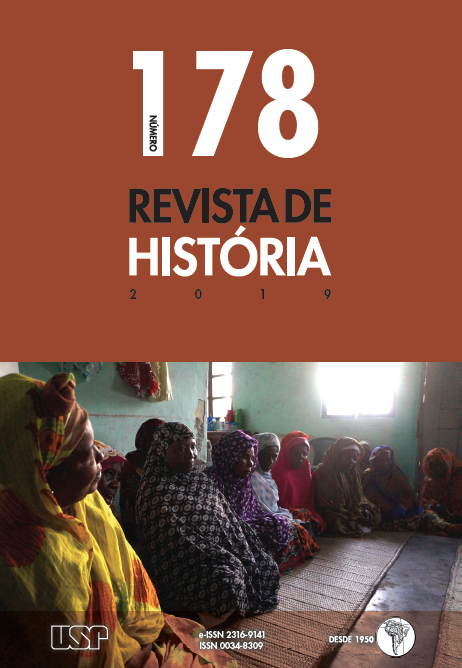Diamonds, development and conflict: the role of the mining sector in the politics of the late colonial state in Angola, 1961- 1974
DOI:
https://doi.org/10.11606/issn.2316-9141.rh.2019.143722Keywords:
Diamond industry, colonial Angola, Angolan liberation war, Lunda, State formationAbstract
This article analyzes the relationship between the State and the diamond sector during Angola’s “second colonial occupation”. It starts in 1961 with the beginning of a struggle between various groups for colonial Angola control, and ends with the withdrawal of the Portuguese from the colony after the overthrow of the Estado Novo by a military coup in Lisbon in April 1974. During that time, Portuguese colonialism, while refusing political openness to nationalist movements, became embroiled in a series of legal and economic reforms that put the colony on a fast track for industrialization. However, the diamond sector remained essential to defending State power in a strategic but hostile area – an area that remains, for historical reasons, beyond the reach of formal State institutions.
Downloads
References
Imprensa
Financial Times (Londres).
Arquivos
Arquivo Oliveira Salazar (AOS).
Companhia Diamantes de Angola (CDA).
Instituto Português para o Apoio ao Desenvolvimento (Lisboa).
Polícia Internacional e de Defesa do Estado (Pide).
Arquivo Nacional Histórico de Angola (Anha).
Instituto de Investigação Científica Tropical (IICT).
Fontes secundárias
CLARENCE-SMITH, William Gervase. The third Portuguese Empire, 1825–1975: a study in economic imperialism. Manchester: Manchester University Press, 1985.
CLEVELAND, Todd, Rock solid: African laborers on the diamond mines of the Companhia de Diamantes de Angola (Diamang). Tese de doutorado: University of Minessota, Minneapolis, 2008.
COELHO, João Paulo Borges. African troops in the Portuguese Colonial Army, 1961–1974: Angola, Guinea-Bissau and Mozambique. Portuguese Studies Review, vol. 10, n. 1, 2002, p. 129–50.
COOPER, Frederick. Africa since 1940: the past of the present. Londres: Cambridge University Press, 2002.
COOPER, Frederick & STOLER, Ann Laura. Tensions of Empire: colonial cultures in a bourgeois world. Berkeley: University of California Press, 1997. DOI: https://doi.org/10.1525/california/9780520205406.001.0001.
DAVIDSON, Basil. In the eye of the storm: Angola’s people. Londres: Penguin 1975. ISBN: 9780385052986.
FERREIRA, Eduardo Sousa. A lógica da consolidação da economia de mercado em Angola, 1930–74. Análise Social, vol. 21, 1985, p. 83.
FREYRE, Gilberto. Aventura e rotina: sugestões de uma viagem à procura das constantes portuguesas de caráter e ação. Recife: É Realizações, 1953.
GALLAGHER, Tom. Portugal: a twentieth-century interpretation. Manchester: Manchester University Press, 1983.
GOUVEIA, Jorge Augusto da Cunha; MONCADA, Pedro Cabral de; AGUILAR, José Frederico. Riquezas minerais de Angola. Lisboa: Cooperação Portuguesa, 1993.
HODGES, Tony. Angola: from Afro-stalinism to petro-diamond capitalism. Londres: James Currey, 2001. ISBN: 9780852558515.
KEESE, Alexander. “Proteger os pretos” – Havia uma mentalidade reformista na administração portuguesa na África tropical (1926–1961)? Africana Studia, n. 6, 2003, p. 97-125.
LARMER, Miles. Local conflicts in a transnational war: the Katanguese gendarmes and the Shaba wars of 1977–78. Cold War History, vol. 13, n. 1, 2013, p. 89-108. DOI: https://doi.org/10.1080/14682745.2012.727801.
LONSDALE, John. States and social processes in Africa: a historiographical survey. African Studies Review, vol. 24, n. 2 e 3, p. 139–225. DOI: https://doi.org/10.2307/523904.
MABEKO-TALI, Jean Michel. Dissidências e poder de Estado: o MPLA perante si próprio. Luanda: Editorial Nzila, 2001. ISBN: 9789728834326.
MARCUM, John. The Angolan revolution: the anatomy of an explosion (1950–1962). Cambridge: MIT Press, 1978.
MBEMBE, Achille. On the postcolony. Berkeley: University of California Press, 2001, p. 80. DOI: https://doi.org/10.2307/3097305.
MESSIANT, Christine. 1961: l’Angola colonial, histoire et société: les prémisses du mouvement nationaliste. Bâle: Schlettwein Publishing, 2006. ISBN: 3–908193–17–6.
NEWITT, Malyn. Portugal in Africa: the last hundred years. Londres: Hurst, 1981. ISBN: 978-0582643772.
PEARCE, Justin. Control, ideology and identity in civil war: the Angolan Central Highlands 1965-2002. Tese de doutorado não publicada, Oxford University, Oxford, 2011.
PIMENTA, Fernando Tavares. Brancos de Angola: autonomismo e nacionalismo (1900–1961). Coimbra: Minerva, 2005.
PIMENTA, Fernando Tavares. Angola’s Euro-African nationalism: the United Angolan Front. In: MORIER-GENOUD, Éric (ed.). Sure road? Nationalisms in Angola, Guinea-Bissau and Mozambique. Leiden: Brill, 2012, p. 59–85.
PORTO, Nuno. Modos de objectificação da dominação colonial: o caso do Museu do Dundo, 1940–1970. Lisboa: Calouste Gulbenkian Foundation, 2009. ISBN: 978-972-31-1294-8.
SÁ, José Pinto de. Conquistadores de almas – memórias de uma militância e de prisões políticas (1970–1976). Lisboa: Guerra e Paz, 2006. ISBN: 9789898014092.
SAUNDERS, Gregory. The foreign policy of Angola under Agostinho Neto. Tese de mestrado não publicada, Naval Postgradutate School, Annapolis, 1983, p. 26–27.
YOUNG, Crawford. The African colonial State in comparative perspective. New Haven: Yale University Press, 1997. DOI: https://doi.org/10.1080/03612759.1995.9949208.
YOUNG, Crawford. Zaire: the shattered illusion of the integral State. Journal of Modern African Studies, vol. 32, 1994, p. 215–16. DOI: https://doi.org/10.1017/s0022278x0001274x.
Downloads
Published
Issue
Section
License
Copyright (c) 2019 Revista de História

This work is licensed under a Creative Commons Attribution-NonCommercial 4.0 International License.
Autores que publicam nesta revista concordam com os seguintes termos:
- Autores mantém os direitos autorais e concedem à revista o direito de primeira publicação, com o trabalho simultaneamente licenciado sob a https://creativecommons.org/licenses/by/4.0/ (CC BY). Esta licença permite que outros distribuam, remixem, adaptem e criem a partir do seu trabalho, mesmo para fins comerciais, desde que lhe atribuam o devido crédito pela criação original. É a licença mais flexível de todas as licenças disponíveis. É recomendada para maximizar a disseminação e uso dos materiais licenciados.
- Autores têm autorização para assumir contratos adicionais separadamente, para distribuição não-exclusiva da versão do trabalho publicada nesta revista (ex.: publicar em repositório institucional ou como capítulo de livro), com reconhecimento de autoria e publicação inicial nesta revista.
- Autores têm permissão e são estimulados a publicar e distribuir seu trabalho online (ex.: em repositórios institucionais ou na sua página pessoal) a qualquer ponto antes ou durante o processo editorial, já que isso pode gerar alterações produtivas, bem como aumentar o impacto e a citação do trabalho publicado (veja O Efeito do Acesso Livre).
How to Cite
Funding data
-
Fundação de Amparo à Pesquisa do Estado de São Paulo
Grant numbers 2017/13092-1







